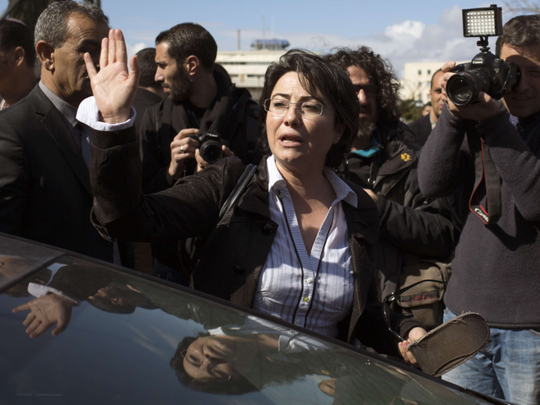
Haifa: Love her or loathe her, Palestinian MP in Israel, Haneen Zoabi, leaves few people indifferent. Opponents see her as the enemy within, but for others she’s a passionate defender of the Palestinian cause.
In the six years since she entered the Knesset, Israel’s parliament, Zoabi has become the most controversial figure on the Israeli political scene and a common face inside courtrooms.
Four times she has been called on to respond to accusations of “hostility” towards the regime.
And as a general election approaches — the second in just over two years — she has once again dodged another right-wing attempt to bar her from standing, with the Supreme Court overruling a ban imposed by the Central Elections Committee.
An MP with the secular Balad party, she holds the seventh slot on the newly formed Joint Arab List, a united slate which includes representatives from across the political spectrum, from Communists to Islamists.
Born in Nazareth, the largest Palestinian city inside the Green Line, the elegant 45 year old has forged a reputation as an outspoken politician willing to say the unthinkable regardless of the consequences.
And she has pledged to continue bringing the Palestinian struggle to end the occupation to the heart of the Israeli political system.
“Send Haneen back to Jenin!” cry her adversaries, referring to a Palestinian town in the northern West Bank.
“This is my land. I am not a colonist. I will stay in my home,” she hits back at those calling for her to leave the country and go and live in the occupied West Bank or the Gaza Strip.
Haneen, a descendant of Palestinians who stayed on their land when the Israeli regime was established in 1948, refuses to back down.
“Our presence in parliament is a way of making visible the Palestinian Arabs living in Israel. This country acts like we don’t exist,” she says.
“They treat the [West Bank and Gaza] Palestinians as enemies, but they treat us as if we were wiped off the map.”
Haneen, who has a degree in philosophy from Haifa University and an MA in media and communications from occupied Jerusalem’s Hebrew University, has become the most well-known Palestinian personality in Israel, largely because she doesn’t mince her words.
When she was first sworn in as an MP in 2009, she walked out of the plenum before they sang the Israeli national anthem “in order not to be a hypocrite” by staying for an anthem “that does not represent me”.
Political outcast
Since that moment, she has been a political outcast.
One by one, she has taken on Israel’s taboos, most recently taking flak for her refusal to recognise the so-called “Jewish character” of the regime.
This flashpoint issue played a role in the collapse of Prime Minister Benjamin Netanyahu’s fractious coalition government and the decision to call a snap election on March 17.
A petition demanding her exclusion from parliament racked up 40,000 signatures in less than 24 hours.
“In the Knesset, 80 per cent of my colleagues do not even acknowledge me. I take part in sessions and debates and then I leave,” she says.
“I don’t hang out in the Knesset cafeteria.”
It was in 2010 that she really began to be hated in the Israeli street after taking part in a pro-Palestinian flotilla heading for Gaza which was subjected to a botched raid by Israeli commandos in which ten Turkish activists were killed, sparking a diplomatic crisis with Ankara.
Haneen was arrested and escaped prison only because she had parliamentary immunity.
Her Knesset colleagues denounced her as a traitor and tried to have her parliamentary privileges revoked, and the regime’s interior minister even tried to strip her of citizenship.
But the move was ultimately blocked by then speaker Reuven Rivlin, now Israel’s president.
Haneen also faced death threats, and the Knesset had to grant her armed protection.
Five years on, she can often be seen joining demonstrations inside Green Line and the West Bank, yelling slogans in Hebrew at the police and army or addressing the crowd in Arabic.
And when she’s not out fighting by pounding the streets, she’s doing the same thing from inside the Knesset.
“We are not an opposition like those which exist in countries which guarantee the rights of all their citizens, like in Europe,” she says.
By taking part in Israeli political life her role is “to represent my people before the state, and not to represent the state to my people”.










